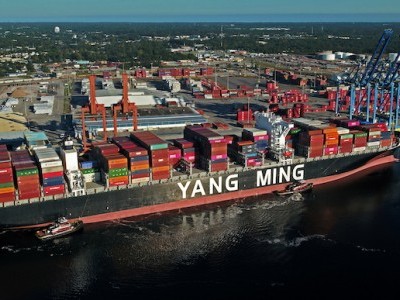MOL and DSME Obtain AIP for Design of FSRU “Cryo-Powered Regas” System
Mar 03, 2020Development of New Technology to Reduce Environmental Impact
Mitsui O.S.K. Lines, Ltd. (“MOL”) and Daewoo Shipbuilding & Marine Engineering Co., Ltd (“DSME”) have jointly obtained “Approval in Principle (AIP)” from Bureau Veritas for the design of a new cold energy use regasification system, “Cryo-Powered Regas”, for Floating Storage and Regasification Unit (FSRU,*1).
MOL and DSME have been jointly developing this “Cryo-Powered Regas” system to enhance fuel consumption efficiency and reduce CO2 emission of FSRU(*2).
For the “Cryo-Powered Regas” system, a cold power generation technology based on Organic Rankine Cycle (*3) will be implemented in the FSRU regasification process.
The “Cryo-Powered Regas” system, which MOL and DSME obtained the AIP this time, will enable to utilize the LNG cold energy as power generation by adopting the Organic Rankine Cycle in the FSRU regasification process. The system is targeted to reduce the fuel gas consumption and CO2 emission for FSRU approximately 50% by recovering approx. 70% of the power consumption in the regasification process at maximum rated regas flow rate(*4).
Organic Rankine Cycle system itself is a proven technology that has been utilized in multiple onshore LNG terminals for around 40 years. This will be however the world’s first case to adopt the system for FSRU.
Similar Stories

Hapag-Lloyd WDS/WID surcharge to the U.S. East Coast and Gulf ports
View Article
MSC schedule update – Trade Asia to USA West Coast
View Article
Stena RoRo takes delivery of the battery hybrid vessel Guillaume de Normandie
View Article
Indian Register of Shipping reflects on 2024 and sets ambitious goals for 2025
View Article
Yang Ming announces 2025 Trans-Atlantic services
View Article
Exclusive interview with AWO’s Jennifer Carpenter
View ArticleGet the most up-to-date trending news!
SubscribeIndustry updates and weekly newsletter direct to your inbox!





